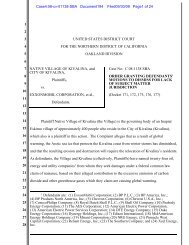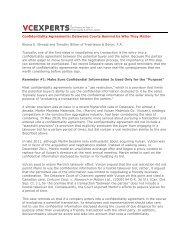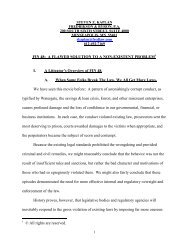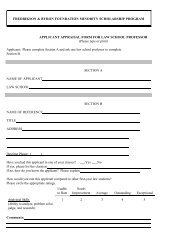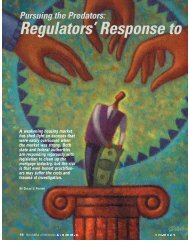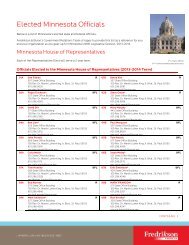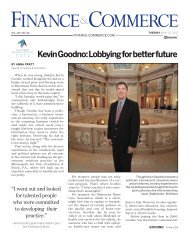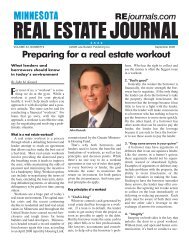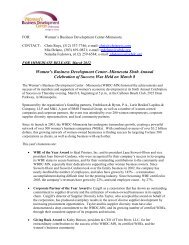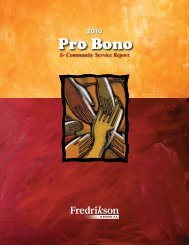Lousene Hoppe Article - Fredrikson & Byron PA
Lousene Hoppe Article - Fredrikson & Byron PA
Lousene Hoppe Article - Fredrikson & Byron PA
Create successful ePaper yourself
Turn your PDF publications into a flip-book with our unique Google optimized e-Paper software.
Minnesota a place where everyone has equal access<br />
to the justice system.<br />
Justice for All: An Institutional Approach<br />
Chief Judge Davis’ focus on equal and meaningful<br />
access to the court system can be seen in every role<br />
he takes on. A prime example of this commitment is<br />
the Pro Se Project, which resulted from a collaboration<br />
between the Minnesota District Court and the<br />
Minnesota Chapter of the Federal Bar Association.<br />
Chief Judge Davis saw a need for the economically<br />
disadvantaged to have access to a skilled and qualified<br />
lawyer; he made the project a top priority of his<br />
tenure as chief judge.<br />
Since its inception in May 2009, the Pro Se Project<br />
has had a goal of providing civil pro se litigants with<br />
free legal consultation. When a civil pro se litigant<br />
appears in Minnesota District Court, the judge or magistrate<br />
judge may refer the case to the Pro Se Project<br />
to find a volunteer lawyer to consult with the pro se<br />
litigant. The judge’s referral letter to the pro se litigant<br />
contains contact information for the Pro Se Project<br />
coordinator, Tiffany Sanders, and the judge copies<br />
her on the letter with any relevant court documents.<br />
Sanders then connects the litigants with a volunteer<br />
lawyer to evaluate their case and advise them. If the<br />
case has merit, the attorney will often choose to enter<br />
an appearance on the litigant’s behalf.<br />
The Pro Se Project has had far-reaching impact.<br />
One litigant went to the hospital seeking care for his<br />
mental health issues. The hospital staff, unsure of how<br />
to handle him, called the police, who arrested the<br />
litigant and took him to the county detention center.<br />
Unfortunately, he was placed in painful restraints for<br />
hours, which exacerbated his behavior. As part of<br />
the resolution of this case, his Pro Se Project attorney<br />
got the detention center to change their policies<br />
regarding how they hold inmates with mental health<br />
issues. Sanders reports: “As a result of the skilled representation<br />
and counseling [the litigant] received, he<br />
completely turned his life around. I recently met with<br />
him at [his lawyer’s] office and he looks great, is doing<br />
great, and is truly thankful to the Pro Se Project for<br />
helping him regain his life.” The litigant later wrote the<br />
following letter in support of the Pro Se Project:<br />
For nearly a year I was a very heavy burden on<br />
the Court. People who don’t know what they<br />
are doing often are. Competent counsel early<br />
on would have saved much. It took extra time,<br />
effort, and patience, but fortunately the Court<br />
saw through my mistakes and mistakes it made<br />
because of me. The judge asked a Pro Se Project<br />
leader to consider this case. The first face-toface<br />
meeting was with [two local attorneys] …<br />
They treated me as professionally as if I had<br />
been an executive with a major company …<br />
The expertise and kindnesses of many attorneys<br />
with already full plates have rippled through<br />
countless lives in unimaginable ways.<br />
Last year, the American Bar Association selected<br />
the Pro Se Project to receive the Harrison Tweed<br />
award, one of the ABA’s most respected honors.<br />
Magistrate Judge Franklin L. Noel, the court’s liaison<br />
to the Pro Se Project, gave credit to Chief Judge Davis,<br />
noting that it was the chief judge “who had the vision<br />
to see the need for the program.”<br />
Justice for All: An Individualized Approach<br />
Matthew G. Tveite, a U.S. probation officer in the<br />
District of Minnesota, has worked with Chief Judge<br />
Davis for 10 years. “He is a firm believer in individual<br />
justice,” says Tveite, “which is not defined by<br />
a book or mandated by a group. Chief Judge Davis is<br />
always focused on the person before him.” The chief<br />
judge strongly promotes integration for those who<br />
are serious about reforming their lives. Tveite has<br />
seen the difference that this individualized attention,<br />
from someone in a position of power, can make for<br />
individuals with extreme challenges, such as addictions<br />
and multiple convictions. In one of Tveite’s first<br />
cases, a robbery, the defendant had a lengthy criminal<br />
history that dated back to 1977. He was also a longtime<br />
IV drug user. “During a probation hearing, Chief<br />
Judge Davis addressed him directly,” Tveite recalls.<br />
Among other things, the judge assured the defendant<br />
that he could still have a life if he really wants it, if<br />
he could use the resources offered and figure out<br />
how to change. Chief Judge Davis’ words made a<br />
huge impression on the defendant, who noted that<br />
the judge “treated him like a human being.” Tveite<br />
recalls that the defendant was released in 2007. “He<br />
was clean and doing well enough on probation that<br />
he was allowed to go on a fishing trip to Mexico.”<br />
Those who have worked for Chief Judge Davis<br />
universally remark on his sensitivity to those who<br />
appear before him and his demand that everyone<br />
be treated with respect, regardless of race, gender,<br />
disability, or other circumstance. Brenda Anderson<br />
was Chief Judge Davis’ court reporter for many years<br />
when he was on the Hennepin County Bench and for<br />
several years after he became a federal judge. When<br />
asked, she said she could speak for hours about cases<br />
where he made a real difference in the lives of individuals.<br />
“He was all about respect—respect for those<br />
appearing before them, for their lawyers, for his staff,”<br />
Anderson recalls. “Judge Davis is very sensitive to<br />
people and their unique circumstances.”<br />
Bill Manning, a lawyer in Minneapolis and longtime<br />
friend of the chief judge, remembers that on<br />
Nov. 21, 2000, President Nelson Mandela attended<br />
the NAACP annual banquet in Minneapolis. “Judge<br />
Davis and I got the opportunity to meet the president.<br />
I informed President Mandela that Judge Davis<br />
was one of the finest federal judges in this country.”<br />
davis continued on page 30<br />
September 2012 | The Federal Lawyer | 29



